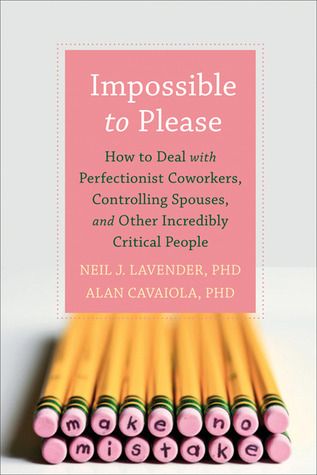Perfectionism
Are You in Love With a Controlling Perfectionist?
What to do when Mr. Perfect turns into a controlling nightmare
Posted July 21, 2013

At the beginning of the courtship, the controlling perfectionistic man presents himself as a very good catch indeed. Meticulously dressed, exceedingly well-mannered, conscientious, hard-working and considerate, the controlling perfectionist presents himself as a very good catch indeed. He is so thoughtful that he remembers your birthday by giving you a front row ticket to the concert of your favorite band andtakes you there in a rented private limo. Heck, he even celebrates your mother's birthday and takes her to her favorite concert and then afterwards caps that off by planting a small orchard of her favorite fruit trees!
This guy is amazing! Diligent, hard-working, attentive, he always seems to say and do the right things.
As the relationship progresses however, there appears to be a darker side to his controlled and reserved nature. Their initial ardor soon disappears and he begins to rarely show affection. If you ask them, for example, to say the words "I love you" they will reply with comments such as "I wouldn't be here if I didn't love you". Or "I told you already I love you. I'll let you know if that changes." He never seems to want to make a connection with you and always find some excuse. When you try to schedule some together time, you find that he is "just too busy".
Things worsen when he begins picking on you for nearly anything. "Do you have to chew so loudly; must you scratch your feet before you put on your shoes; do you always chew your gum so loudly?" Or even things like "Are you gaining a few pounds? You could run with me if you would only get up at five o'clock in the morning like I do." Nothing seems to please them, they seem to have a knack for finding the 1% that is wrong and ignoring the 99% that is good.
Moreover you find that he is intensely finicky, controlling and critical. Everything must be done his way. The dishes have to go into the dishwasher is way, the pool cover must come off at exactly the same date each year, and the car must be driven only at a certain speed. The neighbors don't cut their grass correctly; your best friend never combs his hair right, your mother talks too loud. And, yes it is true; they are always "secretly correcting your grammar." You find that nothing you do is good enough. In spite of all of your best efforts; and believe me, you have probably tried just about everything, they are "Impossible to Please".
Things progress from bad to worse. The once ardent lover's lovemaking becomes mechanical and antiseptic. They become emotionally detached and indifferent. You learn that they are only attentive in matters of intimacy because it is the "right thing to do"; not because they feel like doing it.
So who are these people and how did they get that way? Perfectionistic and controlling people; especially when they are extreme in these behaviors are referred to as having Obsessive Compulsive Personality Disorder by psychologists. According to DSM -5, personality disorders are a unique group of psychological disorders in which there is an "enduring pattern of inner experience and behavior that deviates markedly from the expectations of the individual's culture, is pervasive and inflexible, has an onset in adolescence or early adulthood, is stable over time, and leads to distress or impairment. Obsessive Compulsive Personality Disorder, according to DSM-5, is a particular type of personality which there is a "pervasive pattern of preoccupation with orderliness, perfectionism, and mental and interpersonal control, at the expense of flexibility, openness, and efficiency, beginning by early adulthood and present in a variety of contexts..." Some other symptoms include preoccupation with details rules and lists, excessive devotion to work, over conscientiousness, being scrupulous and inflexible about matters of morality and ethics, and ability to discard worn out or worthless objects as well as stubbornness, miserliness, and insistence upon doing things their own way. (Diagnostic and Statistical Manual of Mental Disorders, 5th Edition, 2013.
One of the unique characteristics of Obsessive-Compulsive Personality Disorder is the fact that these individuals often see their symptoms as virtues. This makes them think, feel and behave quite different than other types of mental disorders. Thus the person with Obsessive Compulsive Personality Disorder would not see nor accept their controlling perfectionism; rather they would claim that they believe in doing things correctly and that other people should as well as them. Alarmingly, most of these individuals go through life thinking that they really have no interpersonal issues and are perfectly normal; perhaps even super normal.
One thing that many people do not know about the controlling perfectionist is that they are just as critical with themselves as they are with others. Thus, they are their own worst enemy. Arguing with them or pointing out their flaws only serves to validate their concerns regarding their own shortcomings thereby making the argument escalate as they argue vehemently to defend themselves.
The thing to keep in mind is the fact that these individuals have a distorted view of human perfectionism. They set the standards way too high, far above what any human could achieve. Thus they feel they are always falling short, yet they keep striving. Worse yet, they inflict the same ridiculously high standards on others as well.
So what can you do if you're involved with one?
In our latest book, Impossible to Please: Dealing with Perfectionistic Coworkers, Controlling Spouses and Other Incredibly Critical People, (Lavender and Cavaiola, 2012), we offer many suggestions on how to manage the controlling perfectionist in your life. Here are some suggestions:
First of all, you need to recognize that you are not this defect laden person who they see you as. He is not some personality expert in human behaviors who is qualified to proclaim which of your personality traits and behaviors are acceptable and which isn’t. Sure, it's difficult to keep your self-esteem when the person you love is hammering away at you night and day. But this is no place for the faint hearted, so stand your ground and lose the idea that they are in any position to deem you worthy or not. Take a hard look at yourself and ask yourself the question "am I relying too much on this individual for my self-esteem? Am I an approval seeking people pleaser?" If you answer that question yes you will need to address your own issues before you go on to interact effectively with your controlling perfectionist.
Secondly keep in mind that their controlling and perfectionistic nature is not your responsibility. You didn't cause it. Moreover, you can't change them. And don't even think about curing them; you won't. Forget about trying to give them a "personality overhaul". Although these individuals can do very well in psychotherapy, therapeutic improvements usually take time and should best be handled by professionals well-trained in the treatment of personality disorders.
Also, bear in mind that the controlling perfectionist thinks they're normal and any attempt at telling them that they are critical will usually go nowhere. You'll find they usually respond by making such remarks as "listen, things are either right or they're wrong. Do you have something against doing things right? Isn't the world screwed up enough without one more person screwing it up even more?"
Look for teachable moments, such as when you're controlling perfectionist expresses genuine emotion or gives up some of their control. In other words, when he expresses his true human nature with all its frailties and blemishes and lets down his guard momentarily. Express your appreciation but then let it go. Don't talk it to death with remarks such as "Remember when you let me pick the vacation? You had fun right? If you did it before why don't you do it again this time?" Recognize the fact that they're letting down their guard and being human; that's right, truly human and not some distorted perfectionistic machine that they sometimes think they are. Just be accepting. Respond nonverbally, for example by squeezing their hand or simply kissing them on the cheek.
These will all go a long way in helping you to transform your relationship.

Impossible to Please... by Drs. Lavender and Cavaiola
And don't forget to check this column regularly. Both I and my colleague Dr. Alan Cavaiola will be blogging regularly to give you more insights on the "Impossible to Please" person in your life!




